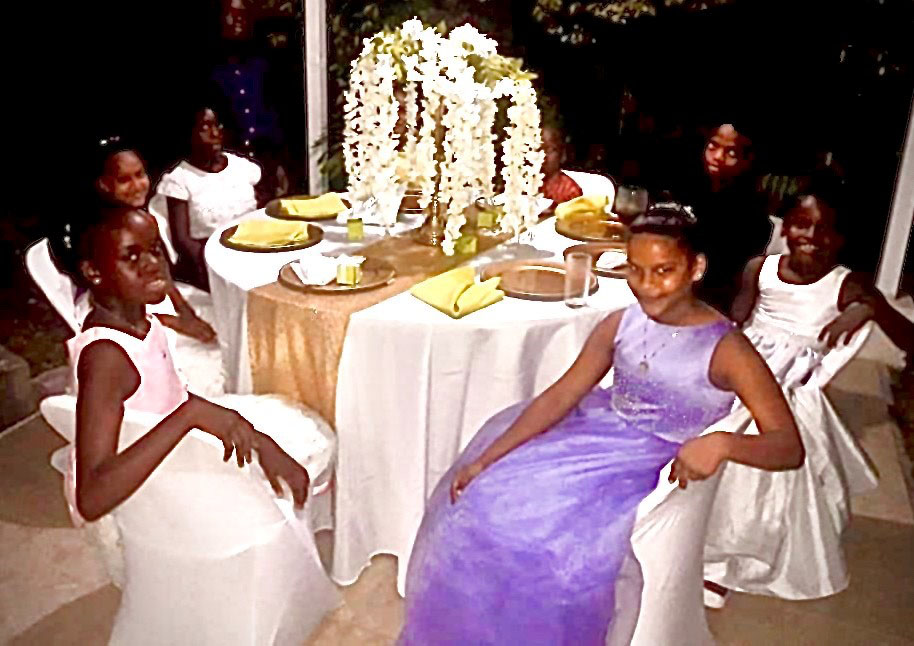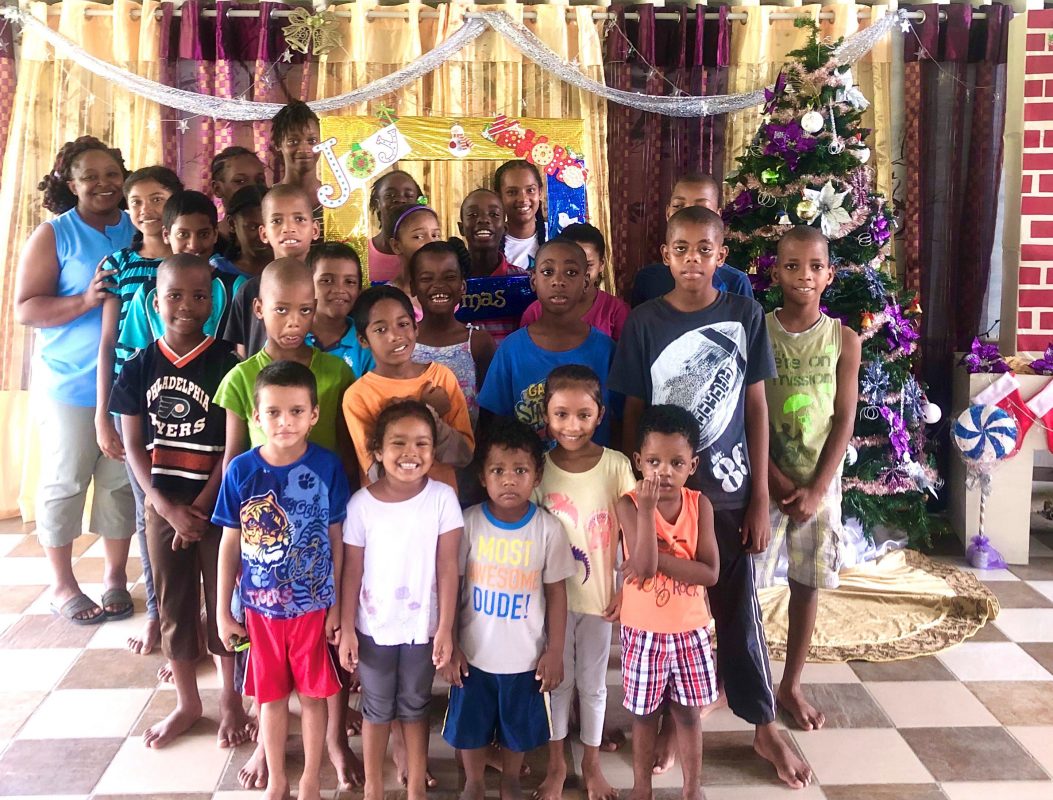With festive Carols playing, the decorations and excited chatter from the boys and girls, you knew it was Christmas when you entered the Save R Kids Children’s Home at Cornelia Ida, West Coast Demerara.
The children, who were home for the holidays, had decorated the Christmas trees, hung the streamers and made the centrepieces, a photo booth and other decorations to create the festive look.
Kathleen Campbell, administrator of the orphanage told Stabroek News that the fun part was that the boys and girls competed against each other to decorate the Christmas trees.
She said the children love when the Christmas season comes around because of the special attention they get and all the parties they are invited to.
This year, they attended a party hosted by the Food for the Poor organization, at the Rose Ann Fun Park and Resort at Parika, East Bank Essequibo.
They got to see Santa at a party at the National Park that the Save Abee Foundation hosted and were also invited to parties organized by the Ministry of the Presidency and the Rotary Club.
Some people would also keep parties for them at the orphanage.
But Campbell said the orphanage would reserve Christmas Day or Boxing Day to have their own party. The children would enjoy music and lots of food and other goodies.
But the fun does not stop there. On Old Year’s Day they would treat them like royal guests at an elegant buffet dinner at the orphanage.
Campbell’s sister, Fidella Peters, who is also her assistant, is in charge of planning the events and of the supervising the decorating.
About the elegant dinner, Peters told SN that said they would prepare delicious dishes and have proper table settings.
The children would choose their very best outfits and dine in fine style.
After that they look forward to welcoming the New Year with fireworks. Even the younger children would stay up and enjoy.
During the holiday season many people would show their generosity to the children by providing them a lot presents.
Campbell said last year the children started a programme to distribute their extra presents to the needy children in the community.
They felt happy with the initiative and this year, she said, they plan to share their presents again.
Family
Campbell said everyone is like a family; the atmosphere is like a normal household and they “don’t call it an orphanage… Everyone knows everything that is going on. And they have chores like normal households.”
She said too that they do not “schedule them (the children)… The only time they have a slight schedule is at school time.”
A special tutor would go in the afternoons from 4 O’clock on weekdays to assist the children with their homework and assignments.
They would be finished by 7 pm and then have dinner and do devotion before going to bed.
On Saturdays teachers would come in to volunteer in all the subject areas.
Their performance was not that good in the beginning but Campbell said “they have gotten a jump start and have improved a lot since I took over three years ago.”
She is pleased at the academic stage they have reached, “given their backgrounds and the fact that some of them never went to school” before going there.
The children would have fun attending the yearly jamboree and would go for tours at the museum and other places.
Campbell said they would like to take them out more often but they do not have a driver for the bus belonging to the orphanage. They are looking for a reliable person to drive and someone who can supervise the children.
They also want the children to be involved in dancing, swimming and other activities but the opportunities are not available there.
She said Saturdays are left open for family members to visit the children. The response has not been that great though and “just a few would come once in a while.”
Shelter
The home once served as a shelter for battered women in the hideout location. It now provides safe spaces for the children whose lives have been disrupted.
Campbell said the children have found comfort at the home as they try to cope with various social issues that they faced.
The orphanage was established 18 years ago at Atlantic Gardens, East Coast Demerara.
It was relocated after the building that once housed the shelter called Genesis Farm, was bought.
Campbell said the shelter was deemed a ‘hideout’ because it was the only building among the cane-fields at the time. It was accessed through a road that the Guyana Sugar Corporation owned.
There was no electricity and they had to trek the long road in the dark.
But according to her, “the estate took back the road” and the orphanage is now being accessed through the new housing scheme.
That road is in a deplorable state and when it rains, it is almost impassable. Campbell said even though it is a long way in from the public road some of the taxis would refuse to drop them there.
She hopes that those in authority see the need to fix it urgently.
The home is governed by a board along with three churches in the US that assist financially. It is being managed by a committee in Guyana.
Food for the Poor also provides donations while many people would sponsor daily meals.
Patricia Johnson and Campbell’s mother, Michelle Campbell, founded the orphanage.
She and her sister, Fidella Peters, her assistant, took over after her parents, who were in charge of the home, migrated.
Currently there are 34 children, from ages four to 19-years-old. Most of the children attend the public schools. Three who are excelling have received sponsorship to attend the Academy of Excellence while another is a student of the Carnegie School of Home Economics.
Reunite
When they reach the age to leave, Campbell said, the welfare services may reunite some of them with their parents or other relatives.
She said too that the children “are free to stay for as long as they want. If family members never turn up and they are well-behaved we would keep them.”
Some of the students would remain if they choose to continue studying.
She told this newspaper that when the social workers bring them, they may relay the backgrounds of the children.
This way they are able to understand them better.
The children would not receive regular counseling “unless they act up.”
According to Campbell and Fidella, they would observe from the children’s behaviour that they “may have a lot of issues bottled up… But we were not trained as social workers so that can be a challenge.”
From January they are “planning to get a social worker on site to help them deal with it (issue) and bring them back into society.
“Working with children can be challenging but at the end of the day it can be rewarding. It is beautiful to make a child smile and you can give them that comfort and love,” Campbell said.
Even though they have been in charge of the orphanage for a short time the sisters said this is the third generation that they have been involved with.
Campbell said she loves it when they go out and some of the children (now grown up) would call out for “aunty.”
She said too that they are “still in contact with the children they have looked after before.”
A few of them have gotten married while some were placed into foster care.
She recalled that “one boy was 24 when he left. He had no family to go to and he started working and rented a house to stay.”
There were also cases of others being in their 20s and they did not have anyone to go to.
In instances also, some of the children would be placed at the home temporarily. “It is not like the parents want to give them up but they may need someone to brace them until they are ready.”
Since they started, more children used to be adopted, including four who were taken overseas.
But now the adoptions have slowed and they are leaning mostly to foster care.
Campbell pointed out that many of the children “know their families and would meet them sometimes when they go out. They don’t ever forget where they come from.”









